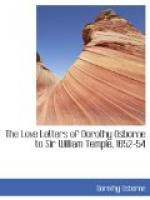The passage of Cowley which Dorothy refers to is in the second book of Cowley’s Davideis. It opens with a description of the friendship between David and Jonathan, and, upon that occasion, a digression concerning the nature of love. The poem was written by Cowley when a young man at Cambridge. One can picture Dorothy reading and musing over lines like these with sympathy and admiration:
What
art thou, love, thou great mysterious thing?
From
what hid stock does thy strange nature spring?
’Tis
thou that mov’st the world through ev’ry
part,
And
hold’st the vast frame close that nothing start
From
the due place and office first ordained,
By
thee were all things made and are sustained.
Sometimes
we see thee fully and can say
From
hence thou took’st thy rise and went’st
that way,
But
oft’ner the short beams of reason’s eye
See
only there thou art, not how, nor why.
His lines on love, though overcharged with quaint conceits, are often noble and true, and end at least with one fine couplet:
Thus
dost thou sit (like men e’er sin had framed
A
guilty blush), naked but not ashamed.
I promised in my last to write again before I went out of town, and now I’ll be as good as my word. They are all gone this morning, and have left me much more at liberty than I have been of late, therefore I believe this will be a long letter; perhaps too long, at least if my letters are as little entertaining as my company is. I was carried yesterday abroad to a dinner that was designed for mirth, but it seems one ill-humoured person in the company is enough to put all the rest out of tune; for I never saw people perform what they intended worse, and could not forbear telling them so: but to excuse themselves and silence my reproaches, they all agreed to say that I spoiled their jollity by wearing the most unreasonable looks that could be put on for such an occasion. I told them I knew no remedy but leaving me behind next time, and could have told them that my looks were suitable to my fortune, though not to a feast.




